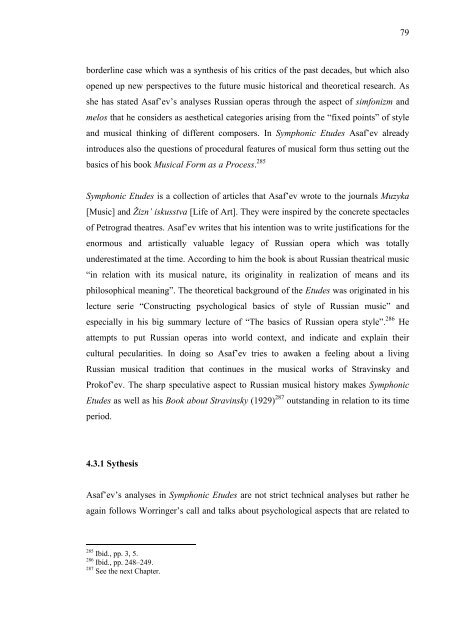Boris Asaf'ev and the Soviet Musicology - E-thesis
Boris Asaf'ev and the Soviet Musicology - E-thesis
Boris Asaf'ev and the Soviet Musicology - E-thesis
You also want an ePaper? Increase the reach of your titles
YUMPU automatically turns print PDFs into web optimized ePapers that Google loves.
orderline case which was a syn<strong>the</strong>sis of his critics of <strong>the</strong> past decades, but which also<br />
opened up new perspectives to <strong>the</strong> future music historical <strong>and</strong> <strong>the</strong>oretical research. As<br />
she has stated Asaf’ev’s analyses Russian operas through <strong>the</strong> aspect of simfonizm <strong>and</strong><br />
melos that he considers as aes<strong>the</strong>tical categories arising from <strong>the</strong> “fixed points” of style<br />
<strong>and</strong> musical thinking of different composers. In Symphonic Etudes Asaf’ev already<br />
introduces also <strong>the</strong> questions of procedural features of musical form thus setting out <strong>the</strong><br />
basics of his book Musical Form as a Process. 285<br />
Symphonic Etudes is a collection of articles that Asaf’ev wrote to <strong>the</strong> journals Muzyka<br />
[Music] <strong>and</strong> Žizn’ iskusstva [Life of Art]. They were inspired by <strong>the</strong> concrete spectacles<br />
of Petrograd <strong>the</strong>atres. Asaf’ev writes that his intention was to write justifications for <strong>the</strong><br />
enormous <strong>and</strong> artistically valuable legacy of Russian opera which was totally<br />
underestimated at <strong>the</strong> time. According to him <strong>the</strong> book is about Russian <strong>the</strong>atrical music<br />
“in relation with its musical nature, its originality in realization of means <strong>and</strong> its<br />
philosophical meaning”. The <strong>the</strong>oretical background of <strong>the</strong> Etudes was originated in his<br />
lecture serie “Constructing psychological basics of style of Russian music” <strong>and</strong><br />
especially in his big summary lecture of “The basics of Russian opera style”. 286 He<br />
attempts to put Russian operas into world context, <strong>and</strong> indicate <strong>and</strong> explain <strong>the</strong>ir<br />
cultural pecularities. In doing so Asaf’ev tries to awaken a feeling about a living<br />
Russian musical tradition that continues in <strong>the</strong> musical works of Stravinsky <strong>and</strong><br />
Prokof’ev. The sharp speculative aspect to Russian musical history makes Symphonic<br />
Etudes as well as his Book about Stravinsky (1929) 287 outst<strong>and</strong>ing in relation to its time<br />
period.<br />
4.3.1 Sy<strong>the</strong>sis<br />
Asaf’ev’s analyses in Symphonic Etudes are not strict technical analyses but ra<strong>the</strong>r he<br />
again follows Worringer’s call <strong>and</strong> talks about psychological aspects that are related to<br />
285 Ibid., pp. 3, 5.<br />
286 Ibid., pp. 248–249.<br />
287 See <strong>the</strong> next Chapter.<br />
79

















